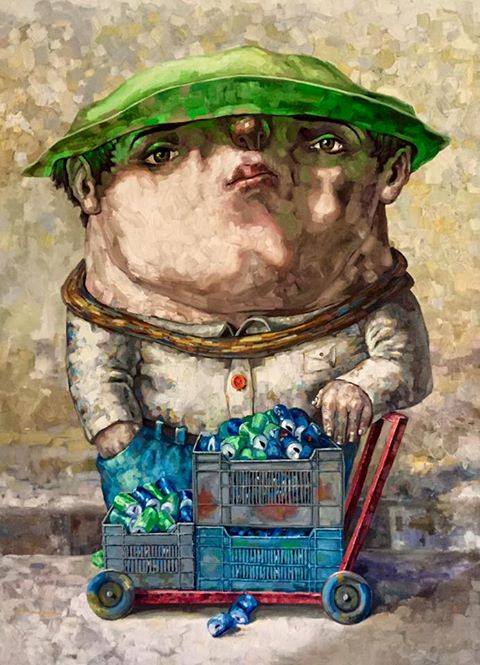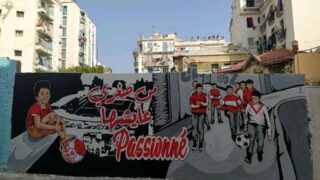
This publication has benefited from the support of the Rosa Luxemburg Foundation. This text may be reproduced in part or in full, provided the source is acknowledged.
In the center of Oran, the capital of West Algeria, dozens of young men offer affordable commercial goods which are widely consumed by the Algerian families who still prefer popular markets to official shops, especially for buying vegetables, fruits and essential consumables such as cooking oil, sugar and milk. The distribution of milk in particular has been irregular for some time in Algeria, sparking sarcastic comments on social media platforms. People mocked the scarcity in the markets, recalling times when, in the eighties of the past century, after the terrible economic crisis caused by the sudden fall in fuel prices, Algerians had to stand in long queues to acquire bread or milk.
These are called "chaotic markets", according to the municipal and local authorities. In the various 48 Algerian provinces, there is a large sector of vendors who are absent from any commercial registry department. In the streets of the cities of Constantine, Oran, and Algiers, selling goods on the sidewalks is a typical and regular scene. Hundreds of vendors, mostly young people, impose their presence on the local authorities of the different municipalities and provinces.
“No” to Integration into the "State Market"
Hundreds of those who carry out commercial activities in the different provinces of Algeria refuse any kind of integration into projects carried out by the public authorities to regulate and organize the informal trade sector inside the municipalities (there is a total of 1541 municipalities nationwide).
Figures from the local sectors show that 63 percent of the municipal shops are not being used by their owners, although the government had allocated a substantial financial sum for their completion. Some of them were turned into offices for organizations or, into cafés.
One of the young men in the city of Mostaganem, in the West of Algeria, is a mobile phone dealer in the popular market of Ein el-Safra’. Though, he describes himself as being unemployed. "Many of the shops established by the municipality do not correspond to the flow of trade. Sometimes, their location is not suitable or encouraging for commercial activity, so they make very little money. Working in one of those shops would not even allow me to make a daily living or regular income.” He adds that in the Souk (market) of Ein el-Safra’, a vendor does not need a shop as it is enough to display the limited number of goods in his possession anywhere for the customers to gather around him in dozens. These customers go to the souk for two reasons: first, the relatively low prices of the commodity compared to those of the organized shops, and second, the opportunity to resell used items in these parallel markets to other parties, who might resell them, in turn, in the "regular" shops. The young man explains that this second reason is actually one of the basic ways to cheat and sell fraudulent merchandize.
Many of these "disorganized" merchants rejected the attempts of the municipal officials to integrate them into the organized "trade centers" that had been established under the project called "One hundred shops in each municipality". Instead, they continue to sell in the parallel markets, practicing the “bazaar trade” right before the eyes of the authorities. According to the latest figures, one hundred thousand of the shops established by the municipalities in Algeria are still underutilized and poorly managed. These shops have been deserted and empty for many years. Figures from the interior and local sectors show that 63 percent of the municipal shops are not being used by their owners, although the government had allocated a substantial financial sum for their completion. Some of them were turned into offices for organizations or, into cafés.
Why did the Authorities Fail to Eradicate Parallel Trade?
The question has been asked repeatedly on the Algerian media platforms: Why hasn’t parallel trade been eliminated despite the authorities’ efforts in this area, whether through developing commercial centers or encouraging the unorganized merchants to integrate into a regulated culture of organized trade?
Most of the answers given by the economic specialists agree that many of the problems facing the economic policies in Algeria are a direct consequence of the prevailing governing mentality, which is based on administering the central State’s decisions through local authorities and institutions.
The absence of a sustainable, adapted strategy by local officials and governors of the provinces to manage the escalation of the parallel trade has allowed it to grow into an octopus extending its tentacles to the smallest municipal areas in Algeria, where there previously were no markets for seasonal or parallel trade. For instance, the small municipality of Hajaj, located in Mostaganem, more than 450 kilometers away from Algiers, now has a market where dozens of young people display goods such as home appliances and clothes.
On the other hand, the intentional stalling of some of the "Amyar" (a term that refers to the "mayors", derived from the French word “maire”) in facing the proliferation of irregular vendors in their municipalities implies the possibility of the involvement of local officials in in various forms of parallel activities. Many of the elected representatives who run municipal councils in Algeria exploit these markets in their electoral campaigns. They promise the many young vendors to maintain the status quo and to refrain from compromising their interests. This is an informal agreement between the local municipal officials and the young merchants, and the municipality’s treasury does not gain a single Dinar from it.
Damages done to the Algerian Economy
The latest estimates of official institutions and committees in Algeria indicate that the number of workers in the parallel economy has exceeded 60 percent of the labor force during the last three years. The reason for these numbers is the country's critical financial situation, despite the pro-government political circles trying to promote a margin of state-controlled maneuvering to manage the situation. However, the eradication of parallel trade does not seem to be a priority for the governors and local officials who prefer to focus on housing and reconstruction programs rather than chasing young men selling their goods on the sidewalks. The young vendors in Algerian cities purposefully display their merchandize in areas near to governmental offices, banks and administrative institutions and, so far, the authorities have confined themselves to imposing fines on these violators.
In the absence of alternatives to the issues of unemployment and poverty, this activity becomes one of the telling manifestations of the fragility of the Algerian economy.
The content of this publication is the sole responsibility of Assafir Al-Arabi and Rosa Luxemburg Foundation cannot accept any liability for it.
Translated from Arabic by Sabah Jalloul
Published in Assafir Al-Arabi on 07/06/2018




